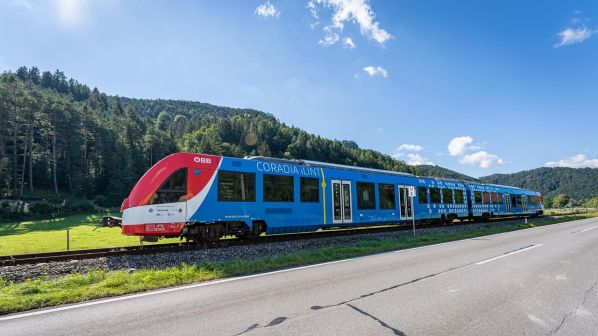The trials will take place on the Aspang and Thermen railways from Vienna Neustadt to Aspang and Hartberg respectively, and on the Vienna Neustadt - Puchberg am Schneeberg - Gutenstein line. The full tests will start on September 12 and run until November 26 with six services set to operate on Mondays and Thursdays, 10 on Fridays and 12 on Saturdays.
Following tests of the vehicles on relatively flat terrain in the Netherlands and northern Germany, ÖBB says iLint will be put through its paces in the more challenging alpine routes in Lower Austria.
A mobile hydrogen filling station has been constructed at ÖBB’s facility in Wiener Neustadt, enabling the railway to trial the complete hydrogen infrastructure required to operate the trains.
ÖBB says it is aiming to become carbon neutral by 2050. In addition to electrification, the railway says it is exploring the potential of hydrogen and batteries as alternative traction solutions on around 1300km of lines in Austria currently served by diesel trains. ÖBB tested a prototype Siemens Desiro ML battery-electric Cityjet Eco multiple unit in passenger service in lower Austria in September 2019.
“We clearly see ourselves as pioneers in testing hydrogen technology on the rails,” says Mr Andreas Matthä, CEO of ÖBB. “As Austria's largest climate protection company, we are actively helping to shape the mobility of the future with technological alternatives.”
As well as Alstom, ÖBB is supported in the project by Climate and Energy Fund, and Verbund, which certifies the hydrogen used during the trial run as green. It is also assisted by Shift2Rail, Austrian Institute of Technology (AIT) and Hydrogen Centre Austria (HyCentA).
“With its use in regular passenger operations for ÖBB, our innovation train Coradia iLint has reached the next milestone,” says Dr Jörg Nikutta, Alstom's CEO for Germany and Austria.

